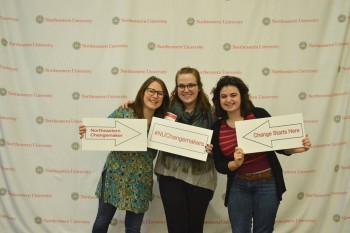Social Entrepreneurship Grows Up at Northeastern
By Professor Dennis Shaughnessy
“I saw this big problem. Desperately poor women not given a chance to build a decent life for themselves and their little kids. So I started a business to fix it. It’s as simple as that!” Muhammad Yunus, founder of Grameen Bank and the 2006 Nobel Peace Prize Laureate

Ashoka named Northeastern University a “Changemaker Campus” last month! Ashoka is the organization that has long recognized excellence in social entrepreneurship education, and now more broadly recognizes university leadership in the field of social change alongside social entrepreneurship education.
The Changemaker Campus recognition reflects the work of the entire ecosystem at NU focused on social change. From the Law School to the College of Social Sciences and Humanities and beyond, the work being done on our campus to create sustainable social change has grown to extraordinary levels.
The work of SEI (really, our students past and present) over the past decade was the catalyst for Ashoka’s recognition of the NU social change ecosystem.
We began teaching social entrepreneurship in the then College of Business Administration (now, the D’Amore-McKim School of Business, or DMSB) in the Fall of 2006. At that time, there were very few social entrepreneurship programs focused on undergraduates, and even fewer housed in business schools. The few that did exist were typically just one class offering each year with a connection to community service centers on campus. We created our own teaching cases, models, methods and frameworks that emphasized interdisciplinary undergraduate learning on a business platform.
Our reason for teaching a social enterprise course and soon thereafter creating a center for social entrepreneurship learning was to give students the chance to see that business can be the most powerful force for good in the world. Muhammad Yunus had just the Nobel Peace Prize for the creation of Grameen Bank, the pioneering microfinance firm and social business. Yunus taught us that in its highest and best form, business is the most powerful catalyst for positive social change. Through innovation and entrepreneurship especially, business has led the way in both creating great wealth and reducing poverty. While increasing inequality is of great concern to all of us, we see the pathway towards a more equal society running through a more informed and enlightened generation of young and deeply committed business leaders.
Our view at SEI was that greed in business was and is the exception, not the rule. Most business leaders are committed to serving others and enriching their communities while at the same time solving problems and building value. We could see a wave of young people keenly interested in the power of business to do good. Our goal was to provide this generation with the opportunities to learn hands-on about how business in its many forms and models can change the world for the better.
Only a very few student signed up initially. Over time, our message of “business for global good” got out across campus, and more and more young people signed up for our courses in social entrepreneurship and related topics. What started as a small seminar grew into crowded classrooms, a business track and an interdisciplinary minor, travel programs to developing countries, and service initiatives in the local Boston community. Within five years, more than 500 students enrolled in a social entrepreneurship course at DMSB enrollments each year, including 100 students into poor communities outside the US. Another 100 students signed up for community service in the urban schools surrounding our campus.
While Ashoka doesn’t formally rank or evaluate social entrepreneurship academic programs, we now appear to be among the largest programs for undergraduates in the US and beyond, with more co urses, programs and activities than many or most.
urses, programs and activities than many or most.
In closing, I’d like to thank all of the students over the past ten years that drove the growth of SEI and our academics. While faculty and staff have also been essential to our efforts, as well as our generous donors, it has always been the students who have driven us to create transformative learning experiences in and outside of the classroom. And most especially, our first student leader who became a co-founder of SEI and a driver of social enterprise education at Northeastern, Esther Chou!


